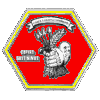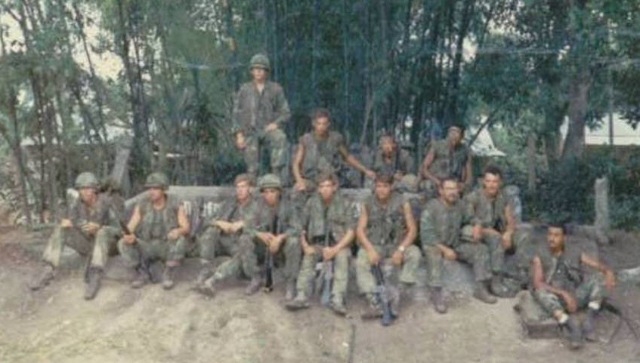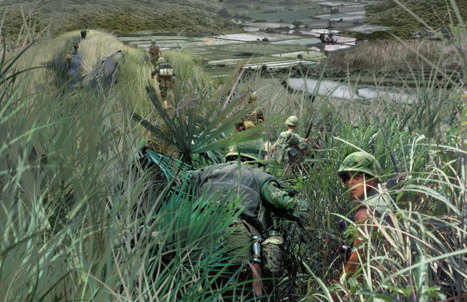







Some of my fellow Marine Corps buddies and me served in the Provisional Rifle Company (PRC) of Force Logistics Command (FLC) in Vietnam. Other than "PRC," the Company was also called "Prov Rifles," but my all-time personal favorite name they called us back then was "Proud Rifles." See what I mean? We were that. We were that in spades.
And that is what this website is all about. This is why I put this website together. We were very proud, and I want you and everyone else to know about PRC and what we did over there. These are my recollections of the company, and the recollections of some of my brothers in arms at the time.
But first, before our Proud Rifle Company story can begin, there is some general background information you'll need to understand about our parent unit, Force Logistics Command:
The Force Logistics Command was established on March 15, 1966. The unit was made up initially of the 1st and 3rd Service Battalions and the in-country elements of the 3rd Force Service Regiment, out of Okinawa.FLC operated out of Camp Books, near Red Beach, a few miles northwest of Da Nang in Quang Nam Province. Our base commander at the time was Brigadier General Mauro J. (Joe) Padalino.FLC was tasked with providing the Third Marine Amphibious Force (III MAF) with supply, maintenance, and service support. FLC was comprised of 396 Marine and 18 Navy officers, and 7,391 Marine and 145 Navy, enlisted men, most of whom were concentrated aboard Camp Books, but operated out of various other locations as well. FLC was under the operational control of III MAF, and the administrative control of Fleet Marine Force, Pacific (FMFPac).The major units that comprised our command within the confines of Camp Books were: Headquarters and Service Battalion; Supply Battalion; Maintenance Battalion; the 7th Motor Transport Battalion; and the 1st and 3rd Military Police Battalions. (The MP units were under III MAF "operational" control.)Under Marine Corps doctrine, a force service regiment (the nucleus that FLC was based on) furnishes all types of logistic support to a division, a wing, and force troops when deployed, and when reinforced, provides the nucleus for a MAF logistics group. The FSR requisitions, stores, and issues all classes of supplies to the ground forces and to Marine airbases.

But - and this I can flat out guarantee - when one of us got shot, or was wounded with fragments from a hand grenade or a booby trap out in the jungles and rice paddies of our TAOR (Tactical Area Of Responsibility), it was pure "infantryman" Military Occupational Specialty "0300" blood that was coming out of our bodies at that time. Some of us didn't even report the injury to higher headquarters. There were no "Hanoi John Kerry's" in our midst. We had no "band-aid types" in our midst. Not even one. We were Marines. We were the men of PRC.
Without purposely trying to disparage anyone else's MOS, I need to explain something else here. We were all volunteers, each and every one of us, to the last man. Had we not volunteered to join the PRC we would not have been out in the bush, the jungle, the plains, and the rice paddies. A lot of kids joined the Marine Corps during the Vietnam War years without really knowing what they were getting themselves into once they got in, finished boot camp, and then joined an infantry unit that was soon to be in the heat of battle in the jungles and airspace of Vietnam.
We were different! We knew just exactly what we were getting into. We knew all about the Viet Cong forces and how merciless they were. We knew about the leeches and the B-52 size mosquitoes, the 10 to 12 foot long King Cobras, and the bamboo pit-viper called the "three stepper," because that's about how many steps you had left before you keeled over, dead in your tracks. It's venom was neurotoxic, extremely deadly. "Neurotoxic" meant that the snakes venom would attack your nervous system. Your nerves would all just begin to start shutting down, one by one. Not a nice way to go. Know how big this guy was? He was only about ten to fifteen inches long, and green in color. He sort of blended in with all of Vietnam's flora and fauna.
During the heat of the summer the temperatures and the humidity were almost running neck and neck with each other, and normally hovering around the 90 to 100 degree mark. If you were not very careful, and if you did not watch out for each other very carefully, there would be heat related causalities. That was a given. You could count on it. That is just one of the reasons we are called a "Band of Brothers." We looked out for each other and made sure that didn't happen.
And the monsoon rains. During the monsoon rain periods when the rain wasn't coming down by the bucket loads it was coming down in a light to medium drizzle that might last for days, or maybe even weeks on end. It would almost drive you crazy. During the night while you were laying in an ambush site you could not even wear your helmet because of the constant beating noise of the rain against it. The rain was all that you could hear while wearing it, and that was a very definite no-no. Your eyes and your ears were your life in the bush. Those, and your weapon and ammunition.
The rice paddies were really something. Ever smell one, really up close and personal? We all sure did. The smell is almost indescribable. Human waste was used to fertilize the paddies. "Night soil" some of us called it. They used that, and they used water buffalo dung, and they used whatever "other" dung they could find. The stench was almost over-powering. But, the good news was, in a few short weeks you no longer smelled it at all. You would be going out to an ambush site somewhere a click and a half away and it would just occur to you all of a sudden that you were no longer offended by the pungent stench. It was sort of like your smell machine just no longer worked with regard to rice paddies. Thank God for little favors.
But lastly, just before you do leave this page, please read what is written down below. The below passage describes the driving force and the mentality of what we Marines did over there:
This sight was last
updated on
04 March 2011 You are visitor number
Neither the United States
Marine Corps nor any other
component of the Dept. of Defense has approved,
endorsed or authorized my web sight.
© Copyright 2002 by Billy Joe Churchwell.